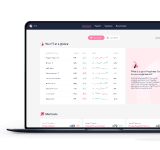Trends Driving IT Experience Management
By Sami Kallio (CEO, HappySignals) and Roy Atkinson
(CEO and Principal Advisor, Clifton Butterfield LLC)

In last year's trends post, we said that AI's impact would be felt in many areas of IT, and it certainly has. Many vendors of ITSM software have introduced AI-enabled versions in the past year, many using Generative AI and the Copilot model. 2024 has been a year of exploration and pilot programs to discover where and how to apply these AI-enabled tools to the greatest advantage.
"More than nine in 10 IT decision-makers project their budgets will increase in 2025, according to the Forrester 2025 Budget Planning Guide for Technology Executives. CIOs and other IT leaders are investing additional funds in employee training in AI and other technologies that are key to the future of business, Forrester says," quoted by CIO.
In 2025, the focus will be on putting AI to practical use and gaining as much return on investment, data insight, and efficiency as possible from its various uses. We'll see whether AI can live up to expectations by streamlining workflows, analyzing vast amounts of data, and assisting in areas from infrastructure management to cybersecurity.
What's Happening with AI Now?
"We are starting to see detailed, specific return on investment from early experiments with generative AI, and that ROI is of sufficiently high confidence to drive investment in the face of economic and political uncertainty," said Jeremiah Stone, CTO at SnapLogic, quoted by CIO.
The question then becomes whether we will see positive or negative trends in employee experience as AI becomes an integral part of the workplace.
An early study by Adobe (July 2023) had some important and interesting things to say on this topic:
"Artificial intelligence and automation are seen as having an almost universally positive impact on work. A near-unanimous number of workers (92 percent) reported that AI technology is positively impacting — with more than a quarter (26 percent) going as far as to call it a 'miracle.' They reported the top productivity gains of AI as #1 saving time (67 percent), #2 helping employees work faster (61 percent), and #3 reducing or eliminating tedious work (45 percent). Nearly half (41 percent) of workers who use AI reported that 'AI has completely changed how I work for the better.'"
Consequences for Employee Experience
There are some key points to consider as we forge ahead in the age of AI. We already know that, as AI and automation take over the repetitive work employees are used to, the types of work tasks and problems reaching the human staff will be more complicated. The days of one-and-done password resets and issues solved by a reboot are rightfully drawing to a close. However, there are other considerations for support as well.
As Paul Leonardi said in Harvard Business Review:
"The faster technology spreads, the less time users have to learn from one another and mimic patterns of use. Second, unlike virtually any other digital technology we're accustomed to, AI-enabled tools are continuously designed to change by themselves. Each time you provide new data to an LLM to produce text or computer code, the technology learns, and its capabilities grow. What it can do for you next week won't be the same as what it could do for you this week. Thanks to the autonomous learning that characterizes the most advanced AI-based tools, your employees aren't learning to use a new technology once—they are learning to use it nearly every time they engage with it."
This will make consistent and frequent monitoring of employee Happiness and Productivity increasingly important. In an environment of constant change, what was true about experience yesterday may not be true today.
People Data
In a forward-looking article written in 2022 called What IT will look like in 2025, Mary K. Pratt wrote, "To succeed, both now and as the future unfolds, CIOs will need to synthesize a range of technologies cohesively to deliver experiences, functionalities, and services to employees, partners, and most definitely customers."
How will they do it? "The trend around data will continue. Organizations will continue to mature in how they use data and its impact on decision-making. It will be critical for the technology team to have knowledge around data, what insights it can provide, and how to use it to further business objectives," says Joan Holman, CIO of the law firm Clark Hill.
XLA Growth and Better Outcomes
A study from PwC six years ago showed how much of a disconnect there was between the enabling technologies companies thought they were providing and what employees were experiencing. With the increasing interest around employee experience in the intervening years—in this case, ITXM and DEX—company managers will have a far better idea of how technology changes affect the workforce.
Interest in Experience Level Agreements (XLAs) has exploded in 2024 and with good reason. Businesses are moving as fast as possible to outpace their competition and simultaneously looking to extract maximum value from their technology and their people. XLAs will be mainstream in 2025 (as Gartner has predicted), not only for internal IT departments but also for Managed Service Providers (MSPs). This will likely lead to a more user-centric, flexible, and value-driven IT service landscape, potentially improving employee satisfaction, productivity, and overall business outcomes.
Conclusions
As pilot programs and experimentation with AI and GenAI morph into real-world utilization, organizations will need to pay close attention to the impacts of these technologies on the workforce. Are the new tools fulfilling their promise of accelerating work, eliminating errors, and keeping employees productive, or are they intruding into workflows and slowing employees down, as some studies suggest?
The way to answer these questions is to pay attention to the ongoing employee feedback throughout the organization. Their experiences—more than ever—will inform us where, when, and how, and most importantly, whether the technologies we adopt are enabling the types of improvements and value production their proponents have been marketing. The wave of hype AI has been riding is now subsiding, and the return on investment is coming due. Higher productivity and more employee happiness are part of that return.






